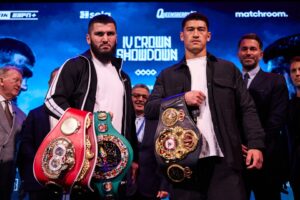He was an NFL Draft prospect ‘the likes of which we have never seen’ before.
Tony Mandarich was supposed to transform the offensive line position in pro football, bringing a Gladiator-type attack within the trenches and becoming a no-doubt Hall of Famer.

But he ended up playing just 86 NFL games.
In draft lore, ‘The Incredible Bulk’ became ‘The Incredible Bust,’ bouncing between two teams, falling out of the league in just six seasons, and never making a Pro Bowl.
“I drank and numbed myself with prescription painkillers so I wouldn’t have to feel the pain of the fall from stardom,” Mandarich wrote for CBS back in 2009.
“I had been… touted as the possibly the best offensive line prospect ever.
“What I had become was an alcoholic and a drug addict, without the tools to handle the ups and downs of ‘real life.’
Overhyped in college, the 6ft 5in, 311lb offensive tackle became the first poster boy for NFL Draft-mania, which is now spread out over three days and nationally broadcast on multiple TV channels.
In 1989, Mandarich was viewed as a generational talent out of Michigan State.
He was drafted No. 2 overall by the storied Green Bay Packers.
“This guy, once in a lifetime,” an ESPN announcer said.
Then it all started to go wrong.


Mandarich struggled to adust to NFL life and fit in with the Pack.
He also couldn’t back up the hype that preceded his lofty second overall draft selection.
After just three years in Green Bay, he washed out of the pros.
“I spent the ensuing three years as an unemployable, miserable wreck, full of self-pity and unable to do anything to help myself of the quagmire I had created,” Mandarich wrote.
Football fanatics from that time still remember an iconic Sports Illustrated magazine cover that eventually became laughable.
A shirtless Mandarich was declared as ‘The Incredible Bulk,’ while the accompanying story on him read like something out of a sports sci-fi novel.


He lifted weights every morning and night, ate seven meals that totaled up to 15,000 calories a day, and wanted to become Mr. Universe after his NFL career was finished.
Throw in his love of ‘Appetite for Destruction’-era Guns n’ Roses when that rock band was on top of the music world, and there hasn’t been an offensive lineman prospect promoted like Mandarich since.
“As a junior he could have started on any of our Super Bowl teams,” Michigan State head coach George Perles, who previously coached on the Pittsburgh Steelers, told SI.
“He may be the best offensive tackle ever.
“He’s faster than any offensive lineman in pro football. There’s probably nobody faster in the world at his weight.
“This is a different player. We’ll never have another.”
Even crazier was the top five of a historic 1989 draft, which helped to take the NFL – then viewed on equal level with MLB and the NBA – to the peak of the American sports landscape.
Hall of Fame QB Troy Aikman went No. 1 to the Dallas Cowboys and became part of a dynasty.

Barry Sanders, viewed by many as the greatest running back of all-time, was the No. 3 pick for the Detroit Lions.
Derrick Thomas, a Hall of Fame linebacker, was taken at No. 4 by the Kansas City Chiefs.
And Deion ‘Prime Time’ Sanders joined the Atlanta Falcons at No. 5, while also preparing for his historic baseball career with the New York Yankees as a two-sport athlete.
Mandarich was so talented, powerful and generational that he was sandwiched between four future Pro Football Hall of Famers.

He also faced serious steroid-use accusations before his name was called by the NFL on April 23, 1989.
“No one’s ever seen a guy who’s 6-6, 320, who can move, who can abuse people,” Mandarich said.
“People everywhere would love for me to be on steroids. They’d love for me to get arrested going 120 miles an hour, drunk, with steroids in my glove compartment.”
Mandarich spent four seasons out of the NFL after being cut by the Packers and got sober.

He returned to spend 1996-98 with the Indianapolis Colts and started ten games during Peyton Manning‘s rookie year.
But a decade later, Mandarich revealed that he used steroids in college and faked a drug test before the 1988 Rose Bowl game.
“I got to the point where it was a struggle to work out three or four times a week because the priority of getting high was above the priority of working out,” he said.
Finally done with the NFL, ‘The Incredible Bust’ turned his life around.
Mandarich’s Instagram bio describes him as a ‘Child of God’ and ‘speaker’, while he posted a photo of himself smiling with Kansas City Chiefs head coach Andy Reid last year.
When NFL great Steve McNair tragically died in 2009, Mandarich tried to put it all in perspective.
“Many professional athletes have a hard time adjusting after retirement,” he wrote.
“We become spoiled by the attention and adoration from the fans, and don’t know where to get our self-worth when we are no longer in the limelight.

“After having been seen as such a ‘superior’ specimen, it is almost impossible for a former pro athlete to ask for help from anyone.
“We can’t bring ourselves to admit that we aren’t strong enough to be able to handle the extreme changes without help.
“It is gratifying to be recognized for our athletic accomplishments, but it’s the adversities that we face – and overcome – that define us as human beings.”



